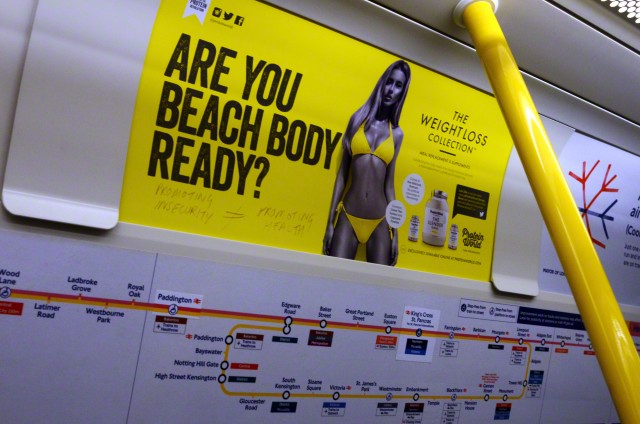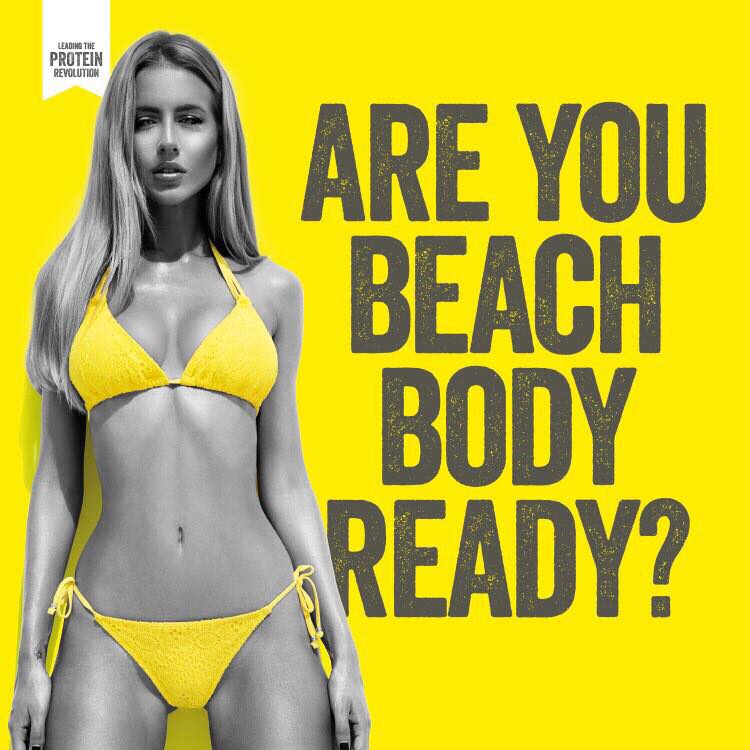Let's ban sexist subway ads
Can we really defend public advertisements that shame women's bodies?


A free daily email with the biggest news stories of the day – and the best features from TheWeek.com
You are now subscribed
Your newsletter sign-up was successful
As if riding New York's subways weren't unpleasant enough. There are the gender-agnostic annoyances like overcrowding, that stench of someone's half-finished McDonald's stowed under a seat, and the increasingly long waits in unbearably hot stations. And then there are those more women-specific ones like the catcalls, groping, unsolicited photographs (sometimes under our skirts!), and worse. Sometimes all a straphanger can do is look up and wait for it all to be over.
Except, wait, it is bad up there, too. This summer we've been subjected to subway cars wallpapered with advertisements that are plain offensive. There's an ad for a plastic surgery group that features a woman holding a pair of tangerines in front of her chest with a sad face, next to a picture of her holding grapefruits up to her chest with a happy face. (Not the first fail from this particular company.) Then there's Protein World's picture of a well-proportioned woman in a bikini next to the caption: "Are You Beach Body Ready?"

I'm not alone in my frustration. A woman named Natalie Considine started a Change.org petition against the beach body campaign, stating that "while other brands might use a model to sell their clothes, their messaging doesn't blatantly tell you that you are inadequate just for being you. According to Protein World, if I don't look like the woman in the ad, I shouldn't even bother to hit the beach this summer." Over 2,000 people have signed the petition, which means some of us are angry, but not nearly as fired up as those in the U.K. There, nearly 71,000 signed a petition against these ads in their public transportation system, which removed the ads shortly after.
The Week
Escape your echo chamber. Get the facts behind the news, plus analysis from multiple perspectives.

Sign up for The Week's Free Newsletters
From our morning news briefing to a weekly Good News Newsletter, get the best of The Week delivered directly to your inbox.
From our morning news briefing to a weekly Good News Newsletter, get the best of The Week delivered directly to your inbox.
These campaigns are well-intended, and clearly when enough people get behind them, they can work. But perhaps we should be aiming higher, targeting not individual ads, but the laws and systems that allow them to degrade our morning commute in the first place.
There are plenty of regulations when it comes to advertising. We already don't see overly sexual or violent ads, and there are plenty of rules surrounding how and where cigarettes and alcohol can be advertised. But needlessly objectifying women? Go right ahead. No matter that there is an established link between the way women are presented in the media and sexual violence and negative body image and eating disorders. Or that it just makes us feel pretty crappy about ourselves on a regular basis.
Furthermore, it is just that much harder to successfully shame a fellow passenger for staring at your chest when in the presence of such ads. The notion that women's bodies are not public property is a hard thing to argue when the subway is covered in celebrations of exaggerated bosoms.
Sure, the objectification of women happens all over our culture. The thing that makes it different here is that advertising, when working correctly, forces us to see it, unlike, say, a video game or magazine. A long subway ride only exaggerates what is already the often uncomfortable relationship that occurs when a consumer of one thing (in this case, a train ride) is forced to reckon with a solicitation for another (the perfect beach body).
A free daily email with the biggest news stories of the day – and the best features from TheWeek.com
Yes, determining just how needlessly and offensively sexist a particular ad is would be difficult. But not more so than the famously subjective "I know it when I see it" standard for obscenity, and we've managed to find ways to regulate that. The fact that the line separating misogynistic and non-misogynistic advertisements is blurry is no excuse for failing to at least try to distinguish between the two. Much like obscenity, this will likely require an ongoing conversation and a set of parameters that shifts with time.
But to get us going I'd like us to start with one possible measure, inspired by Considine's Change.org campaign. Say I look at an ad and my first instinct is to cover a young girl's eyes. If I do this because I am fairly confident this ad will make her feel worse about herself and/or unnecessarily aware of her body and the attention it is or is not getting, then this ad really needs to go.
Women want to look good. Advertisers want to sell us things that help us look good. It's not an inherently toxic relationship. But there is a difference between ads that aggressively assert that one type of body or face is attractive and those that suggest that this cream or exercise class could make us look and feel better on our own terms. The "beach body"? It lies squarely in the former category and we shouldn't have to see it or its ilk anymore.
Elissa Strauss writes about the intersection of gender and culture for TheWeek.com. She also writes regularly for Elle.com and the Jewish Daily Forward, where she is a weekly columnist.
-
 The Olympic timekeepers keeping the Games on track
The Olympic timekeepers keeping the Games on trackUnder the Radar Swiss watchmaking giant Omega has been at the finish line of every Olympic Games for nearly 100 years
-
 Will increasing tensions with Iran boil over into war?
Will increasing tensions with Iran boil over into war?Today’s Big Question President Donald Trump has recently been threatening the country
-
 Corruption: The spy sheikh and the president
Corruption: The spy sheikh and the presidentFeature Trump is at the center of another scandal
